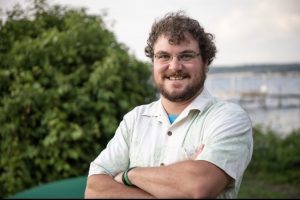When church services in Western New York started to transition to online platforms as COVID-19 shuttered places of worship this spring, local pastors looked to Zach Stahlsmith as their gateway to the internet. Which felt great, he said, only he didn’t have all the answers.

Recording with a phone seemed easiest, but the video turned out pixelated, the sound muffled. Facebook Live was crashing, every attempt a “hit or miss.” Stores were closing one by one, the servers out of stock.
Perhaps, Stahlsmith said, it would always be about the “weighing.”
“I think what we all wanted was perfection right out the door,” he said. “We wanted familiarity, but what we found was that we couldn’t have it all. The priority became to pick what we couldn’t live without and do without the rest of it.”
Stahlsmith has worked as an audio-visual technician at Chautauqua Institution for the past seven years — as a member of the Woods Crew, he is a summer staple zipping across the grounds in his golf cart. A recent graduate of Colgate Rochester Crozer Divinity School, Stahlsmith has also presided over two Week Four morning devotional services. In early March, however, he extended his assistance beyond the Institution, this time to local churches looking to reinvent their services as the COVID-19 pandemic “took its toll,” Stahlsmith said.
Some pastors had too much equipment, others not nearly enough, according to Stahlsmith. Depending on what was available, he helped with YouTube uploads, Facebook livestreams and even radio broadcasts.
“It just felt nice to be able to do something for other people,” Stahlsmith said. “I am still trying to enter into the audio-visual field in a full-time capacity, so it has also been fun for me to learn all of these things, while doing it in a way that’s not just to serve me.”
This is all new for us, too,” Stahlsmith said. “We are building this from the ground up. Things are not going to work perfectly all the time. There have been a lot of patient people, but of course you can’t make everyone happy.”
The Post-Journal published an article detailing Stahlsmith’s work over the past month on March 28, and he said dozens of pastors reached out to him as a result. He has since coordinated with First Covenant Church in Jamestown, Bemus Point United Methodist Church, Park United Methodist Church in Sinclairville, Gerry Free Methodist Church in Gerry, Ross Mills Church of God in Falconer, Findley Lake United Methodist in Findley and Hurlbut Memorial Community United Methodist Church in Chautauqua.
“You don’t want to have a really long service, no matter what church or what their usual tradition is,” he said. “You are basically watching a TV show — you have about 30 minutes before people turn it off. A lot of pastors had to completely reinvent what they’ve been doing for years, even decades.”
The adjustments — shorter services and empty pews — induced a lot of fear, he said.
“Fear was a huge thing,” Stahlsmith said. “(The pastors) didn’t know what to do and they didn’t know how to do it. There are a lot of pastors who are not technologically literate, so the concept of not being able to reach out to people directly was terrifying.”
In mid-April, the outreach calmed down as most churches found their “own rhythms,” so when the Institution’s programming started in late June, Stahlsmith said he looked for ways to carry his off-season knowledge into a new unknown.
“The live-streaming and audio techniques were relatively the same, but I also had to learn brand new things, like how to build sets,” he said. “I was lucky this time because I could work with a team instead of doing it all on my own.”
The ups and downs — late announcements, canceled lectures and files in the wrong folders — have felt the same from place to place: “defeating,” Stahlsmith said. But he has no plans to ruminate this time around; instead, he’s been working on a blooper reel to release at the end of the season.
“If we can’t laugh at ourselves, what can we do?” he said.
The transition hasn’t been an easy one for everyone involved. Stahlsmith said he understands the frustrations this “baptism by fire” has created for the community, and is constantly working to provide the best possible programming to Chautauquans.
“This is all new for us, too,” he said. “We are building this from the ground up. Things are not going to work perfectly all the time. There have been a lot of patient people, but of course you can’t make everyone happy.”
Nonetheless, there is “still so much to look forward to,” he said.
“That weighing will continue, probably forever,” Stahlsmith said. “It’s not perfect, but it’s possible. It’s not our normal, but it’s better than nothing. I know, on the other side of this summer, we will be better than when we came in.”




